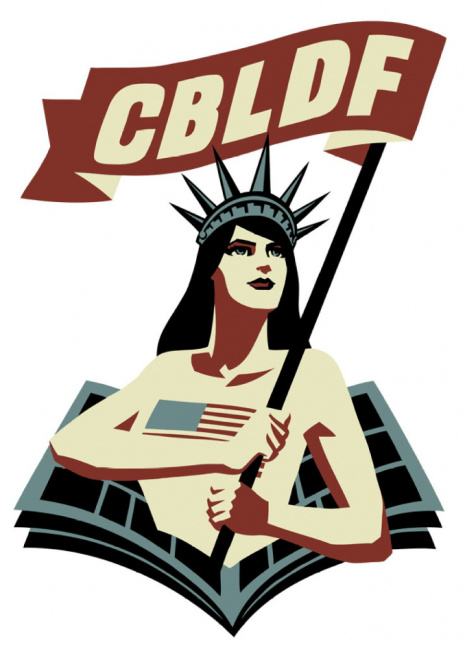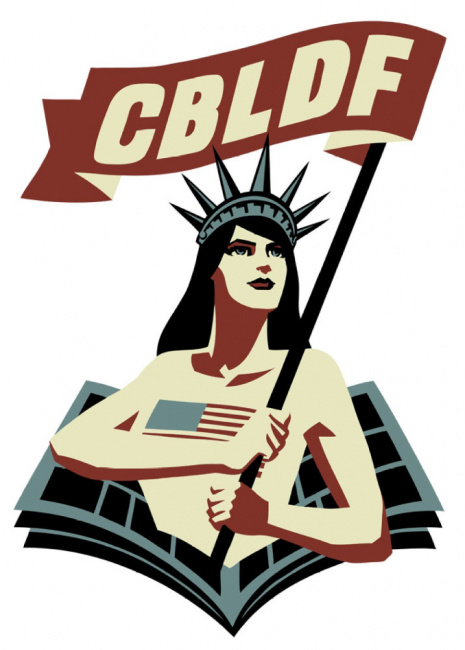The Comic Book Legal Defense Fund is pivoting in new directions after a rough few years that included the departure of longtime Executive Director Charles Brownstein in 2020, a global pandemic, and a collapse in funding at a time of growing free speech battles for comics, CBLDF President Christina Merkler and Executive Director Jeff Trexler told ICv2 in a series of interviews.
We conducted the interviews after reviewing the Fund’s IRS filings, which show the Fund going from over a million dollars in revenue in 2019 to only $395,213 in 2020, the year Brownstein departed after allegations of sexual misconduct (see “Brownstein Out at CBLDF“), and the Covid pandemic took hold. Revenue declined further in 2021 before rebounding in 2022 to $294,426.
All three years from 2020 to 2022 showed expenses exceeding revenues despite rapid expense reduction over the same period, peaking in 2022, when expenses exceeded revenue by around $450,000. That was the year the Fund successfully challenged a Virginia law under which the graphic novel Gender Queer had been declared obscene (see “Judge Finds Obscenity Law Unconstitutional“), and incurred significant expenses in doing so. That was not the only battle the Fund was fighting in 2022, a year when systematic attacks on graphic novels in schools and libraries were accelerating around the country (see “ICv2 Interview: Jeff Trexler“).
The declines in fundraising were not only due to the issues surrounding the Brownstein departure. CBLDF President Merkler noted two other factors that affected the organization. “Basically, we didn’t have the opportunity to fundraise because our previous years had been largely done through conventions,” she explained. “The conventions really didn’t even come back full force until 2023.”
The other factor was the decline in the impact of Humble Bundle, which had been a significant fundraising tool for the Fund in the 2010s. “We understood that was a well that could dry up,” Merkler said of the surge in Humble Bundle funding. “It has not fully [dried up], but it’s definitely not to the level that it was.”
All of that led to a period when the Fund could not bring in the same amounts of revenue. “It was like a forced quiet, you could say,” Merkler explained. “Because we couldn’t fundraise and it was difficult to fundraise through other channels, we chose to cut costs in every way we could. That was the biggest way for us to streamline and make sure that we weren’t hemorrhaging money like everyone else was during the pandemic. The board has concentrated mainly on savings and doing more grassroots fundraising as well as possible grants. Jeff’s been integral in that.”
The Fund’s staff currently consists of Trexler and one other person.
Executive Director Jeff Trexler, an attorney and ethics advisor who joined the Fund in 2020 in the wake of Brownstein’s departure (see “CBLDF Brings in Trexler“), laid out the Fund’s foundation as an organization.
“The CBLDF is an ideal organization from an institution-building perspective,” he noted. “Many nonprofits are formed by a small number of founders who want to make a difference but have few organic connections to the community they serve, not to mention prospective donors. The CBLDF, by contrast, is a direct outgrowth of people with a common interest joining together to solve a recurring problem of direct importance to themselves and the comics community. This was the key to the organization’s ability to garner such impressive support for over three decades.
“Memberships, donations, and merchandise sales were a direct outgrowth of the CBLDF’s greatest capital asset: its ample reserve of intangible goodwill. For much of the organization’s history, the CBLDF had a strong reputation and significant community trust. Supporters recognized that the organization, and their donations, had a substantial positive impact to protecting the comic arts and the comics community-at-large, which in turn attracted not just generous financial and volunteer support. As you aptly noted, this is why the CBLDF had the financial reserves to continue at least for a time after the 2020 crisis.
“It’s also why we were confident that the CBLDF would eventually emerge from the crisis stronger than ever. By restoring the positive connections between the organization and the comics community, the seismic collapse in donations would, we believed, in time give way to people voluntarily offering to help.”
“Happily our recent experience is bearing that out. The generous support that the CBLDF is receiving now – memberships, auction donations, the return of signings, offers to help develop new CBLDF educational material and merchandise, outreach from potential grantors, and of course, the generous sponsorships of the CBLDF at San Diego by Oni Press, CGC, Kickstarter, Mutant, Nacelle Company, and Maestro Media, reflects a return to the original CBLDF ethos as an organic extension of the comics community itself.”
Based on that foundation, Trexler laid out the organization’s fundraising strategy going forward. “Our strategic investments in the CBLDF’s reputation and community trust are now yielding the anticipated dividends, enabling us to pursue what I’ve on previous occasions described as our stretch goals,” Trexler said. “In addition to regaining the levels of support from earlier eras, we have an opportunity to secure the organization’s future by further diversifying its sources of support. There’s much more to this that everyone should be seeing relatively soon, but in brief, this includes:
- Securing grant support for mission-related programs;
- Funding the organization’s administrative infrastructure by means of auctions, product sales, and other revenue-raising initiatives,
- Establishing an active network of volunteers and constituency groups to help the CBLDF fulfill its mission even more effectively while also continuing to grow,
- Creating a dedicated reserve fund to cover legal fees and other case-related expenses,
- Establishing an endowment to provide secure and permanent funding for the CBLDF’s pro bono educational and legal assistance initiatives.
“I understand that an endowment for a comics nonprofit might sound like a novel idea,” he granted, “but in the current climate of book challenges there is demonstrable support for what is at base a foundational nonprofit funding structure. Case in point: the multi-million-dollar capital campaigns by FIRE, the Authors Guild, and other organizations working to stop book bans.”
Free speech battles over libraries are currently ongoing on multiple fronts, most recently in Florida, which passed a law requiring school libraries to remove a book from circulation after just one complaint from a parent (see “Publishers Sue Florida“).
Source: ICv2


